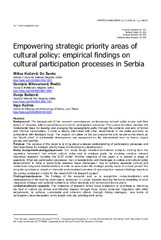Приказ основних података о документу
Empowering strategic priority areas of cultural policy: empirical findings on cultural participation processes in Serbia
| dc.creator | Kočović De Santo, Milica | |
| dc.creator | Milovanović Rodić, Danijela | |
| dc.creator | Babović, Dunja | |
| dc.creator | Kuzma, Inga | |
| dc.date.accessioned | 2023-11-25T21:49:41Z | |
| dc.date.available | 2023-11-25T21:49:41Z | |
| dc.date.issued | 2023 | |
| dc.identifier.issn | 1821-3448 | |
| dc.identifier.issn | 2334-6191 (Online) | |
| dc.identifier.uri | https://raf.arh.bg.ac.rs/handle/123456789/1635 | |
| dc.description.abstract | Background: The background of this research encompasses contemporary cultural policy issues and theirfactors of influence, with a special focus on cultural participation processes. The sphere of culture provides thefundamental base for reading and changing the paradigmatic paths through the contents and acts of formal and informal stakeholders. Culture is deeply interlinked with other departments of the entire economy by connections with feedback loops. The impacts of culture on the socio-economic and natural environment, as the "fourth pillar" of sustainable development, are recognized on the international level by theory, expert groups, and practice. Purpose: The purpose of this paper is to bring about a deeper understanding of participatory processes and their importance for strategic priority areas of cultural policy development. Study design/methodology/approach: Our study design included institutional analysis, starting from the regulatory framework that reflects cultural policy and its strategic goals, by involving previous relevanttheoretical research including the ICET model. Another objective of the paper is to answer a range ofquestions. What are participation processes' main characteristics and challenges in culture and cultural policydevelopment? Is there a relationship between these challenges? How to achieve desirable cultural and institutional integrative transformations in order to accomplish the strategic priority areas of cultural policy? Webring the conclusions based on theoretic and empirical overview of new empirical research findings based on the survey conducted in 2022 for the need of EPICA research project.1Findings/conclusions: The findings of this research lead us to recognition, conceptualization and understanding of the existing participatory processes in culture, towards inspiring the future modelling of more integrative strategic and systemic solutions to reflect desirable and harmonized development. Limitations/future research: The limitations of research reflect future endeavour to contribute to reforming the field of culture (by formal and informal means) through more robust horizontal integration with otherdepartments, to achieve sustainable and coherent effects through linking strategies, new forms ofparticipation, decentralization, arm's length principle, and degrowth policy. | sr |
| dc.language.iso | en | sr |
| dc.publisher | University of Novi Sad, Faculty of Economics in Subotica | sr |
| dc.relation | info:eu-repo/grantAgreement/ScienceFundRS/Ideje/7744648/RS// | sr |
| dc.rights | openAccess | sr |
| dc.rights.uri | https://creativecommons.org/licenses/by/4.0/ | |
| dc.source | Strategic Management | sr |
| dc.subject | Participation in culture | sr |
| dc.subject | Radical innovations | sr |
| dc.subject | ICET model | sr |
| dc.subject | New systemic solutions | sr |
| dc.subject | Degrowth | sr |
| dc.title | Empowering strategic priority areas of cultural policy: empirical findings on cultural participation processes in Serbia | sr |
| dc.type | article | sr |
| dc.rights.license | BY | sr |
| dcterms.abstract | Бабовић, Дуња; Кочовић Де Санто, Милица; Миловановић Родић, Данијела; Кузма, Инга; | |
| dc.citation.volume | 28 | |
| dc.citation.issue | 2 | |
| dc.citation.spage | 45 | |
| dc.citation.epage | 63 | |
| dc.identifier.doi | 10.5937/StraMan2200030K | |
| dc.identifier.fulltext | http://raf.arh.bg.ac.rs/bitstream/id/5833/bitstream_5833.pdf | |
| dc.type.version | publishedVersion | sr |

